Elon Musk says he works 18 hours a day. Who knows if that’s true, but the societal pressure to “be productive” has never been more present than it is today.
Speaking from personal experience, being productive can give us a feeling of “purpose” in a world where purpose is not always easy to come by. The feeling of being productive can also give us a feeling of elevated self-worth.
When we’re not “being productive” it’s easy to feel guilty as if we should be doing something else. … Something more productive.
If you’re someone prone to being lazy, this feeling of guilt can be a good thing and a reminder that you have work to do. But if you’re having trouble relaxing, trouble turning off your brain, or trouble enjoying downtime, then that guilty feeling can be unhealthy for your mental health.
The key is finding balance.
In this article we’ll explore the latest science, expert opinions, and perspectives to understand why we feel guilty about “not being productive” and what we can do to reduce our guilt.
5 Reasons Why We So Badly Want To Be Productive
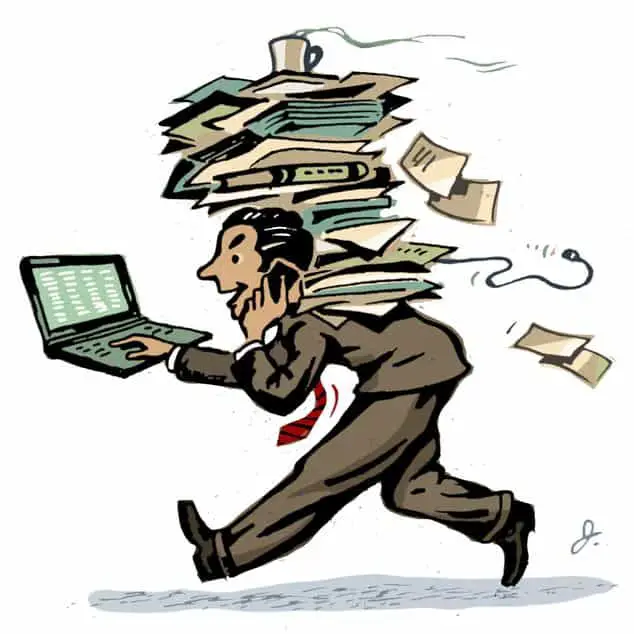
We get productivity guilt because, for decades, the American business mindset has equated how busy you are, with how successful you are. In a lot of circles, you’re a loser for not striving toward success in your life if you’re not constantly in motion.
Steve Harvey’s famous “Millionaires Don’t Sleep” speech is a perfect example. If you’re unfamiliar with it, here’s what he had to say on productivity and achieving your goals:
“That’s a third of your life. There are only 24 hours in a day! You cannot be sleep eight hours a day! You can’t live in L.A. and wake up at 8 o’clock in the morning. It’s 11 o’clock on the east coast. The stock market’s been open for two hours. They already making decisions about your life and you were asleep!”
His point is that hard work is important and currently undervalued, in American culture. He’s right. However, being busy is different than being productive and the two are often confused.
1. Cultural Desirability Of Productivity
The demand for ‘busy’ is stronger than ever.
The ADP Research Institute recently did a study on productivity as it relates to being overworked, and only 31% of the participants found that their never-ending work schedules resulted in career advancement.
Many employees think they have to justify being hired in the first place by overworking, only to find that there’s little to no reward for doing so.
2. Social Media Facilitates Our Tendency To Engage In Social Comparison
Have you ever been innocently scrolling on social media (where we can directly compare ourselves to old classmates and that one annoyingly perfect cousin) and been assaulted by a seemingly endless number of posts from “hard workers” success stories of millionaires enjoying endless luxury?

Many of us can’t help but compare ourselves to “busy & productive” successful looking people online.
But remember, social media, isn’t a true reflection of reality. A lot of the people you see are embellishing how hard they work, and embellishing how “”successful”” they really are.
It’s human nature to present yourself as harder working and more successful than what’s really true.
If you go on sites like YouTube, you’ll see many videos like this: POSITIVE PRODUCTIVITY MORNING ROUTINE, A DAY IN MY LIFE, or HOW TO BE THAT GIRL, WORK, LIFE, AND EXERCISE. These influencers reaffirm the unrealistic expectation that our entire lives can be designed around how productive we can be.
Social media influencers are definitely to blame for the ‘grindset attitude’. For the average person, putting in an honest days work at a job you enjoy and then spending time with friends and family is enough.
Not everyone has to run 12 businesses and drive a Ferrari while “Snapchatting” and on “Tic toc”.
3. Time Anxiety
Ever feel like you just don’t have enough time?
When we say we don’t have enough time, that can mean our milestones are unrealistic or we’re going about them the wrong way.
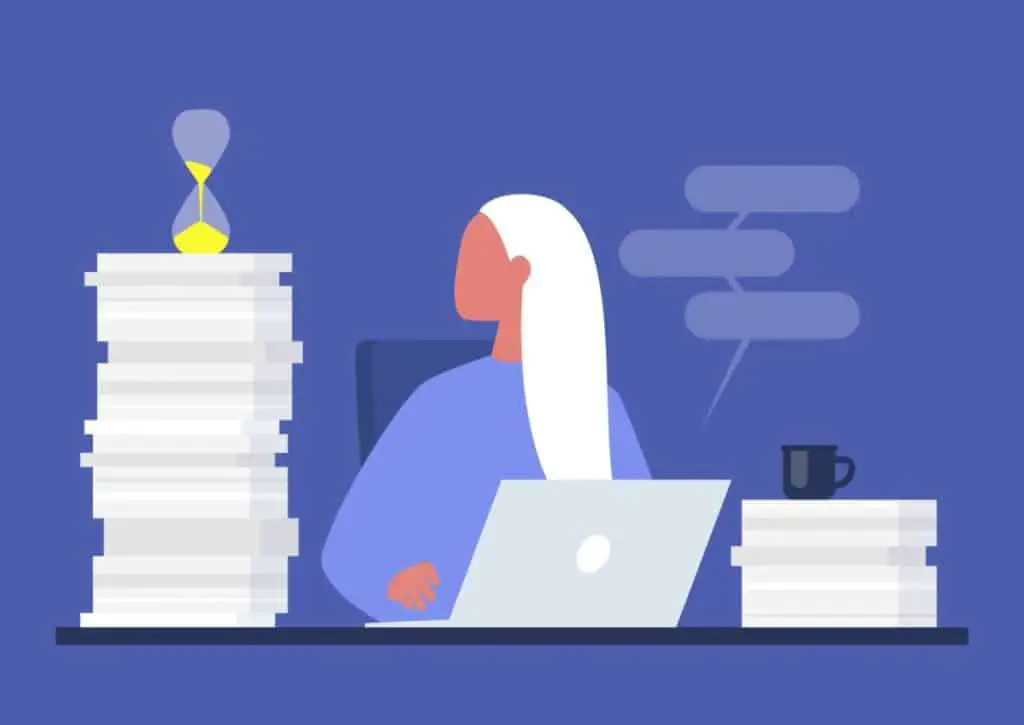
For example, getting your book published by the end of the summer. Or quitting your job and starting a coffee shop business by the end of the year.
Maybe you need a year to write a full novel, or 2 years to save enough to start your own business. Unrealistic time expectations can place unnecessary burdens on us an create a feeling of constantly needing to be busy to hit unrealistic deadlines.
It can also mean that you have the false expectation to force as much as you can into a single day. This can be a good thing, but as the saying goes “there’s only so much water you can drink in a day”. Don’t force it as there’s always tomorrow.
Supposedly, you’re especially successful if you can manage to still have enough energy to post about it on social media and inspire others.
Naturally, this stokes the fires of anxiety in a lot of us.
Where Did We Develop Time Anxiety From?
One theory on time anxiety suggests it started from the introduction of the forty-hour work week. Before the Fair Labor act, workers often worked up to 80 hours per week. It was Henry Ford who introduced the idea of the 40-hour work week, but this hasn’t turned out to be the key to work-life balance that we hoped it would be.
Now, we constantly feel like we’re late for something because we’re trying to condense 80 hours worth of work into a time span of 40 hours each week.
4. Glorification Of “Being Busy”
In 2022, many of us associate constantly being busy with not being lazy, and in this go-go-go culture, being lazy is a cardinal sin.

For example, a lot of us have those family members or coworkers that just can’t sit still, and as a result, they’re wondering why everyone else is just ‘sitting around’. In reality, sometimes it’s healthy to sit around. You don’t owe the world constant productivity.
Rest is part of being functionally productive.
Bemorewithless.com said it best: “No one is too busy to tell you how busy they are.”
5. We Associate Self-Worth To Our Productivity
We’ve come to desire productivity because to many of us, especially in the US, productivity equals self-worth.
As a culture, we have a habit of feeling like we have to justify our existence with work to be welcome in many spaces.
We’ve gotten away from the real truth that your value as a human being isn’t determined by how hard you work. You do not have to justify your existence on our wonderful planet.
13 Ways To Reduce Your Guilt About Not Being Productive
As we mentioned earlier, it’s really easy to fall into this trap of feeling guilty about not being productive. Here are a few different steps to tackling your guilt about not being productive:
1. Stop Comparing Yourself
As Teddy Roosevelt put it, “Comparison is the thief of joy”.

We find ways to compare ourselves to others every day, whether it’s on Tiktok, Facebook, Instagram, or even LinkedIn. When you compare yourself to other people, you forget the whole picture.
You may compare yourself to your former classmate with the expensive house and high power role in corporate America, but what you don’t see is that he’s struggling in his marriage, he feels inadequate, and he has trouble sleeping at night. Maybe he has trouble making friends and only bought that Lexus to make up for his insecurity and loneliness.
We shouldn’t take joy in the fact that others might be struggling, but we should mindfully take note that each unique life has its own challenges, and you have just as many high points and low points as anyone else.
2. Enjoy ‘the Process” Not the Endpoint
When we set a goal, one that we think is ultimately going to be “the big change” that makes everything better, it’s easy to focus on the end goal and lose track of everything in-between.
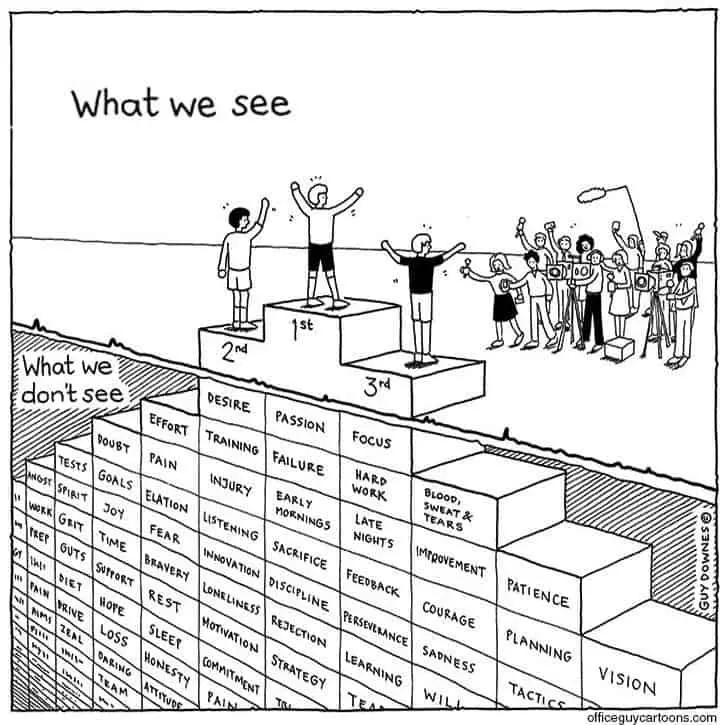
It’s easy to tell yourself, “I’ll rest when I’m dead” or “I won’t stop being productive until I make $250k a year”.
The problem with this method, is that we miss out on the opportunity and benefits of being present “in the now”. When we’re focused on what we ‘should’ be doing, we lose the moment in front of us.
Perhaps instead of scheduling a six-hour study session locked in your room, enjoy a stroll to the coffee shop where you can get an hour or two of studying done for the day and still enjoy the day. Maybe you can even spread the rest of your studying throughout the week.
Take a moment to “appreciate the present moment” and enjoy where you are in your journey because you’ll never get it back.
3. Set Realistic Expectations
I’m guilty of this one! As a writer, it’s really easy to burn out. In the past, I’ve set unrealistic expectations like writing 10,000 words in a day or finishing a book within the week.

Neither of these are realistic expectations when it comes to my craft, and as a result, it puts me in a position of feeling behind, too slow, and constantly needing to be working.
I’m better off giving myself 10,000 words in a week or giving myself 8 months to write a book that would normally take 8 months to write. This was I can enjoy the process, stay present, and stay mentally healthy.
4. Recognize Your Limitations
Part of setting realistic expectations is the need for recognizing your limitations.
Limitations are not a sign of weakness or a fault, they are simply a self-awareness for realistic limits that you should be mindful of as you navigate life.
For example, if you’re not the strongest, most focused reader, it’s probably not the best idea to tell yourself that you’re going to read 50 pages a night. Don’t set yourself up for failure. Accept your limitations, and make plans from there.
Using the example above, start with just 1 chapter a night to build up your reading habit and muscle memory. After a few weeks, up it to 2 chapters a night if you want to increase your reading input.
5. Re-Organize Your To-Do List
It’s easy to be overwhelmed by your To-Do list. Some things are finished, some half started, some are way less of a priority, and 3 new things just popped up that take priority. Where do you even start! Ugh!
I’ve been there (almost every week).

Before you start doing, because you need to do something, try setting your old to-do-list aside and start a fresh one. I personally re-do my list with updates every week.
New priorities on top – easy tasks in a side column – completed items removed – and tada, a freshly organized gameplan to keep you more productive and less “”busy””.
6. Don’t Confuse “Busy” with Productive
When I worked in an office environment, I was constantly surrounded by ‘busy’ types. You know the type. The kind of person that is constantly running around the office, and bragging about how they just have so much to do. Organizing their pens, and labeling the labels.
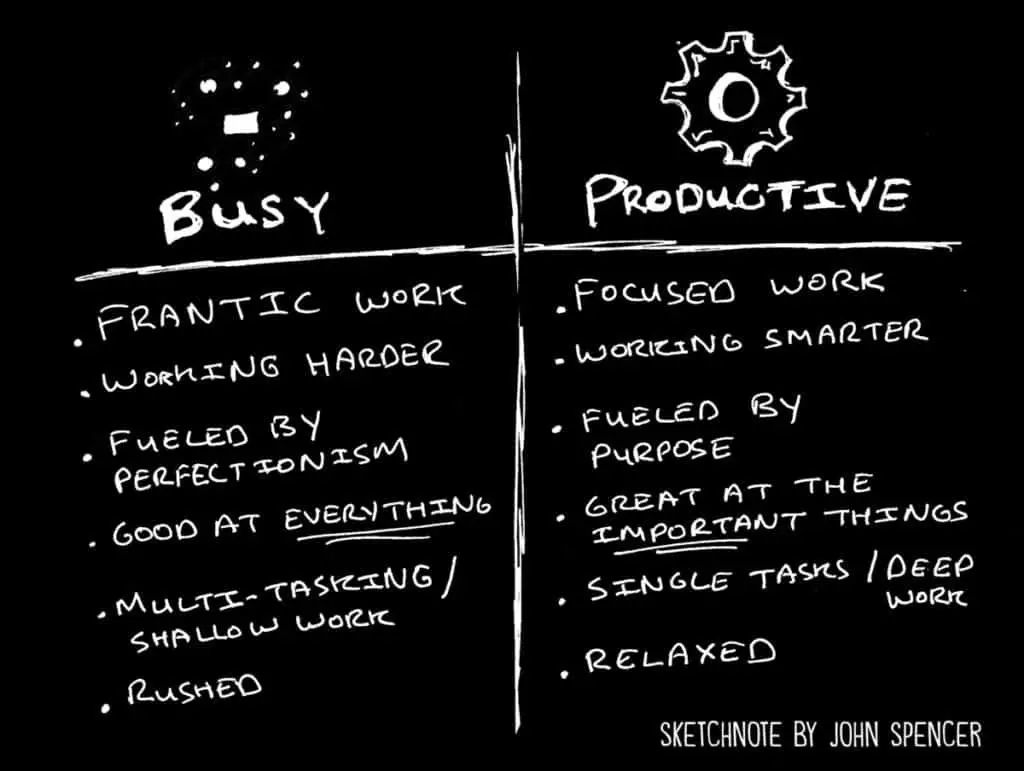
Meanwhile, you’re completing contracts that actually “move the needle” and produce revenue. Busy work keeps you busy, but productive work brings in revenue and accomplishes goals.
Make sure that you’re doing effective work and not just busy work.
7. Recognize That Rest & Relaxation Are A Necessary Part Of Life
You aren’t doing anything wrong by taking a moment to relax!
In fact, sometimes that’s what you should (or need to) be doing. You cannot be there (with-out being mentally checked out) for your family and your colleagues at work if you don’t take a moment to relax, reflect, and reset.
8. Using “Chunking” As a Strategy for Rest Time
Some people find it easier to separate their day into time blocks (chunks of time), instead of working on several individual tasks.
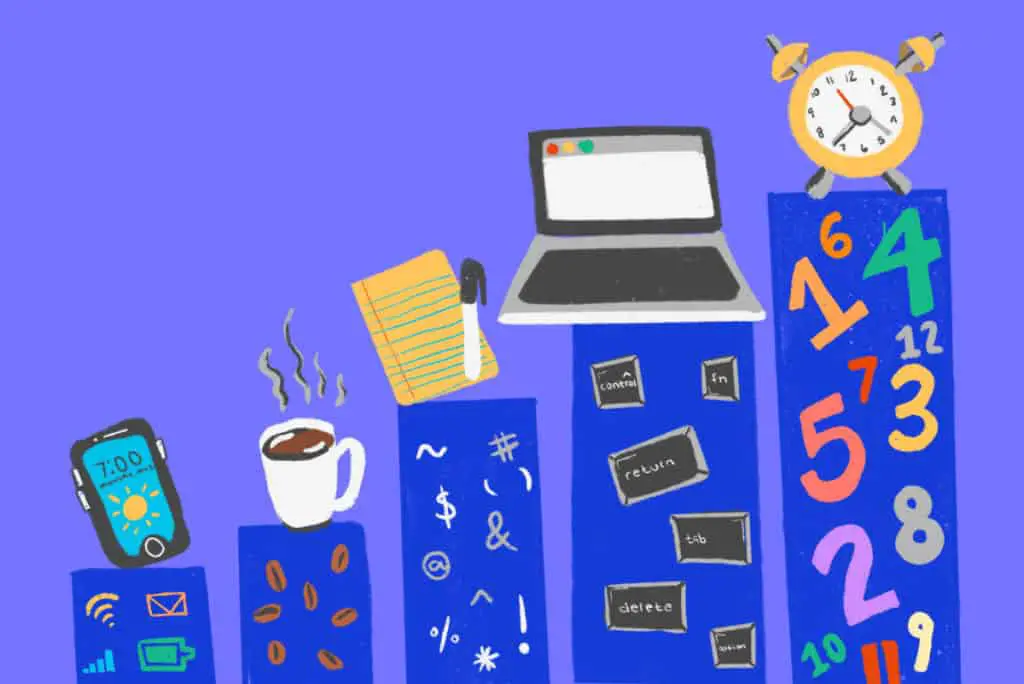
For example, you might decide that from 11 AM to 1PM, you’re going to work on your PowerPoint, and then maybe you’ll have another block for lunch, and another time chunk for your next work task.
This way you’re dedicating time for yourself to make sure you’re working on certain topics.
The same strategy can apply to your rest time. You could schedule as little as a half-hour chunk of time for rest throughout your day. Perhaps after your afternoon meetings, you have a 30-minute stretch of time where you do absolutely nothing. Then, when you get home, you could decide that from 6 PM to 8 PM, you will read, take a bath, and put on a face mask ect.
9. Set Boundaries For Yourself
Boundaries are a lifesaver. You should develop the habit of having certain personal policies in place that prevent burnout and encourage rest.
An example of a personal boundary could be that you keep work at work. You could do this by telling your boss and coworkers that you will not be reachable after a certain time of day.
When you leave the office, you no longer need to be productive, you’re on your own time, or family time.
We can also apply this to certain family members. Your family dynamic might encourage you to take care of everyone. You might be expected to cook, clean, and show up for other people when they have an event going on.
You don’t have to take on everything. Communicate to the people in your life by saying something like, “Sorry, but I don’t have room on my plate for that right now.”
Setting healthy boundaries for yourself is a must do to keep you sanity in todays age.
10. Reframe Your Perspective on Your Thoughts
Don’t listen to your negative inner dialogue. For me, sometimes when I sit down to relax, that’s when the thoughts begin to creep in. “You know you should be at your desk” or “Have you really earned the right to play a video game?”

A way to reframe thoughts like this when they arrive is to say to yourself, “I did the best I could today, and now it’s time to rest.”
11. Gain Clarity When Things “Must” Be Done
You might live in a world full of deadlines. The first draft of your book has to be turned in by the beginning of the month, you have to prepare your kid’s first day of school by the eleventh, and you can’t possibly push that essay back a day because it has to be done NOW.
A great thing about the world we live in is that the universe is far more flexible than we think it is.
Take a step back and examine what actually needs to be done and when. Yes, there will be some cases where things are extremely time sensitive like doing your taxes, but you can usually simplify your tasks to just a couple of things a day.
Take a breath, you probably have more time than you think.
12. Take Full Responsibility For Your Actions
Ultimately, you are responsible for how much rest you get.
You have to prioritize rest and make time for it. You have to ask yourself the hard questions. Maybe you should have advocated for yourself and said you just didn’t have the time.
This puts you back in control. You don’t have to be a victim of the world’s expectations.
13. Distance Yourself From Social Media
This is crucial. Social media only shows you someone else’s highlight reel.

When you see someone on Twitter talking about their successful business, or worse, those tweets about how we could double our productivity, just know that it’s okay to take a step back and log out.
Social media is not real life.
Where Does Guilt Come From?
We’ve talked a lot about the guilt that comes from feeling unproductive, but where does that guilt come from?
To some extent, we absorb feelings of guilt from the media that we absorb. Things like social media, news channels, and television tell us how busy we should be. You might have also been conditioned to despise laziness since you were a kid, with teachers and parents pushing you to work hard all the time.
There’s nothing wrong with hard work, and hard work is extremely undervalued in America, but feeling guilty for not being constantly productive is not healthy.
And finally, that guilt might just come from you. When you have unrealistic expectations of yourself, and you don’t allow yourself to experience rest and recreation in favor of productivity, you send the message to yourself that you’re not worthy.
Final Thoughts: Feeling Guilty About Being “Unproductive”
Rest and relaxation are productive. You cannot truly be productive and put out your best work if you’re burned out. You shouldn’t be lazy, but also, you don’t have to live up to other people’s expectations.
Give yourself some grace, and just know that there is always space for you to relax, reflect, and reset for another day.
Loved what you read?
Hit that share button and let the world in on the secret – we’d be thrilled!
Got thoughts? We’re all ears for your feedback, corrections, or a good old chat. Don’t be shy; drop us a line.
And hey, don’t miss out on our curated list of must-reads in the recommended books section.
Big thanks for diving in with us today!



